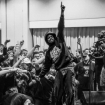"My music isn't meant to be in a genre," says Adam McIlwee, the voice behind the mysterious goth project Wicca Phase Springs Eternal. His songs conjure a sepulchral, enigmatic figure, art-damaged by life's rich pageant. But during a lengthy interview, he sounds animated and gregarious, and audibly blushes when he's congratulated on Corinthiax, the EP that marks his most accomplished work to date. "I'm not good at taking compliments," the Scranton, Pennsylvania–based musician laughs.
McIlwee isn't just the creative force behind Wicca Phase, however; he also sits at the center of a vital underground movement embodied in the GothBoiClique crew. Type "GothBoiClique" in SoundCloud's search engine and you'll elicit over 500 results, from popular tracks with a million-plus listens by Wicca Phase, Lil Tracy, Lil Peep, Mackned, Cold Hart, JPDREAMTHUG and Horse Head; to fan-assembled collections of their assorted tracks; and bedroom musicians who simply add #gothboiclique as part homage, part attention-seeking gesture. (Other members include producers Døves, Yawns and Fish Narc.) McIlwee grew up immersed in punk rock, and in its own new-millennium way, GothBoiClique is as punk as it comes.
Part of GothBoiClique's success, he says, is that the aesthetic is open to interpretation by a generation of listeners drawing organic threads between trap, emo, black metal, dark wave, indie rock and whatever else tickles their fancy. "I'm proud about it," he says of GothBoiClique's mushrooming notoriety. "It was minimal effort. It just happened on its own. The fans let it happen." He speaks poignantly about Lil Peep, the heavily tattooed rap singer whose fatal drug overdose at the age of 21 last November made national headlines. One of Wicca Phase's most popular tracks is "Avoid," a cut he and Peep released last year.
"Our time with him seemed really quick," says McIlwee, explaining that Peep joined the crew about a year before his death. "Obviously what happened is incredibly tragic. I never had anything like that happen … I'd never really had a friend die, much less somebody that I worked on music with. As a person he was sweet and incredibly generous. He made it clear that the success he had coming his way, which was guaranteed because of the deals he made, he wanted to share it with us. I don't think a lot of artists think like that. It's refreshing to hear that from someone who was eight years younger than me. He was a kid."
McIlwee was a kid himself when he stepped away from a burgeoning career in indie rock for the nether regions of internet music culture, one where Southern trap, ambient electronics, emo vibes and goth trimmings are pureed into a virtually unclassifiable sound. Before Wicca Phase Springs Eternal, McIlwee was the lead vocalist of Tigers Jaw, a sprightly pop-punk–inflected quintet that was unafraid to reach across the aisle into heavier circles. The band appeared on a four-way-split with Code Orange Kids — the hardcore group that would become Code Orange — and even lent McIlwee to them for the song "Colors (Into Nothing)," on 2012's Love Is Love/Return to Dust LP.
By 2013, however, McIlwee had tired of band life, and amicably departed. Before splitting, he released the first offering from Wicca Phase: "Bite My Ear," a duet with Tigers Jaw keyboardist Brianna Collins. Initially, Wicca Phase was an experiment: "I was just making drum-machine stuff." Eventually, it became a reflection of his burgeoning interest in the witch house scene and hip-hop's cloud rap/Tumblr scene, both of which blossomed between the late 2000s/early 2010s.
While a childhood fan of mall rappers like Puff Daddy and Bad Boy Records, he had largely given up on the genre by high school. Then he heard Lil B, the enigmatic, iconoclastic rapper and self-described "based god" who virtually pioneered cloud rap with tracks like "Im God" and "Wonton Soup." "He was weird," says McIlwee. "I was confused, and at the same time loved it, and saw someone totally free, creatively and artistically, and that's what I wanted to do. So he got me back into [rap]."
On Tumblr, McIlwee met producer and Lil B collaborator Cold Hart, who was a fan of Tigers Jaw. Listening to Cold Hart's tracks, McIlwee deduced that he could jump on the subterranean beat-maker's tracks and put his unique spin on them. As he nurtured Wicca Phase, it evolved into a conduit for the kind of love dirges that evoke the felt-tipped black melancholy of writers such as Neil Gaiman and Alan Moore, and British goth bands like the Cure and Bauhaus. (On "Scars on Me," a standout from Wicca Phase's 2016 full-length debut, Secret Boy, producer Lederrick turns a few guitar chords from the Cure's "Lullaby" into a hazy, opiate-like scrawl.)
Since 2013, Wicca Phase has issued dozens of tracks through SoundCloud and highly collectible cassette pressings. The project's latest offering, Corinthiax, shows marked growth. While McIlwee's plaintive, punk-leaning croon remains the center, his flows sound more focused and tuneful, and his vocal tone is brighter and stronger, progress that he partly credits to collaborating closely with producer Døves. "I was trying to get out of writing teen angsty songs, so I was coming up with names and mythologies," he says. "Corinthiax was one of those. I first said it in 2013 or 2014. I saw the word Corinthian but replaced the 'n' with an 'x' because it sounded cooler." The character takes flight on the EP's title track, manifesting as a female spirit that emerges at night and beguiles him. "It's part of my witchy, occult stuff," he adds, admitting that he's still fleshing out the idea.
For the next Wicca Phase album, which he hopes to release early next year, he's crafting the blueprints for his musical arrangements. "On the new album, I'm just writing it all on guitar and piano first, and then sending it to a producer to do a beat on, or add a drum machine, or add some bass," says McIlwee, who is co-producing the project with Døves. He aspires to incorporate his love for classic singer-songwriters such as Leonard Cohen and Bob Dylan; fans have already heard hints of that direction with 2017's acoustic Stop Torturing Me EP and the Corinthiax closer "What's the Point of Anything." "It's an extension of what I want Wicca Phase to be, what I've always wanted it to be. I just haven't had much luck channeling it in that direction."

McIlwee hasn't completely forsaken his punk rock past. This summer he joined his old friends Code Orange as a special guest on their U.S. tour. If the crowds found at Wicca Phase Springs Eternal's sold-out shows are any indication, it seems as if he and GothBoiClique are charting a new path between two dominant post-millennial youth cultures. They're clearly having a moment right now.
"I really do believe in the music we're making," says McIlwee. "But I do not foresee Wicca Phase having any sort of radio airplay or anything like that. I think it's solely a cult thing." Stranger things have happened.












